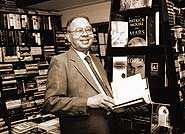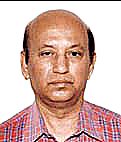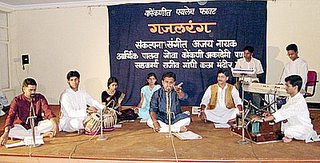Udipi Boarding
Who's afraid of zunka bhakar or savouring the cheapest lunch in Mumbai
Life is not half as people make it out to be. At the Udipi Boarding at Fort Market, for the very affordable sum of Rs.11, on this day and at this hour, you may have a full meal of chapattis, rice, two vegetables, pulses, rasam, sambar, butter milk, pappad, even an unlimited quantity of mango pickle.
With my late and lamented friend, M. L. Kamath, as stylishly Udipi a gentleman as you could have found, I used to walk every afternoon from Bori Bunder to Fort Market for lunch at the Udipi Boarding. I am talking about some 15 years back, a little more_food at the Udipi Boarding was much cheaper then. But at Rs.11, it is not exactly exorbitant now. And, possibly, for its volume and variety, the cheapest lunch that you can get in Mumbai today. Thank you, very much.
Let met give the exact location. It is two buildings away from the municipal Fort Market, going down Minto Road towards the GPO. First, you will pass Special Anand Bhuvan, same owners, then reach Udipi Boarding-Pure Vegetarian Meals, to give its full name. Do not expect an imposing restaurant; in fact, very definitely a poor country cousin. A counter at the entrance, with a hand-written notice declaring: "Mind your belongings", functional tables and benches,, a menu on the wall, a garlanded picture of Sundindru Tirth Swamiji, guru of the Gaud Saraswat Brahmins, am open kitchen, occupying almost half the premises, two basins with liquid soap thoughtfully provided to get the coconut oil off the hands. That's all.
Lunch is between 10 a.m. and 3 p.m., there is no dinner. If you go around 1 p.m., you will have to stand in a queue, at its longest extending down the steps and on to the pavement. But such is the loyalty of its regulars that they do not mind standing in a queue. In any case, the turnover is fast. The consumption of a full meal takes an average of seven minutes. Seated at the counter. In overall charge is young Vivek Shenoy, who, in the tradition of Udipi restaurateurs, personally goes to the Byculla Market every morning and buys the vegetables. This in spite of the fact that the Fort Market is next door, because the Byculla one has fresher and cheaper vegetables.
Now, for some house rules. As you enter, from the elder Mr. Shenoy you buy your lunch coupon at Rs.11. If you want Dahi with your lunch, you buy a Rs.12 coupon. And if you want any extra helpings, you buy extra coupons at Rs.2 per extra item. Then, after you have bought the extra coupons, in case you do not use them, on your way out after the meal, you return them at the counter and get your cash back.
The other day, when I reacquainted myself with Udipi Boarding, I went there by noon, when the place was comparatively empty, and I bought the Rs.12 coupon, which entitled me to the dahi. Plus, a Rs.2 coupon for the tupa. I will explain tupa later. Let us get down to the meal. First, a waiter brought a tumbler of butter milk and a bowl of dahi. Then the thali came: Two chapattis, thin, neither oily nor dry, two round cups of rice (surti kolum, bought in New Bombay), diced boiled beetroots, slightly lemony, shredded cabbage, green peas in a medium gravy, a bowl of lemon rasam, a fried pappad, a dash of mango pickle. There was no limit on the rasam and sambar. I had two extra bowls of the rasam, lifted the bowl up and put it to my lips, peppery peppery hot, the best mulligatawny in the world, it brought tears to my eyes as it trickled down my throat. Each day there is a rasam, please note. On Mondays, it is kokum rasam, Tuesdays mixed masalas, followed by channa, lemon, tomato (I like that), and horse radish. The ingredients are boiled, crushed, the juice extracted from them, then water and spices added, a vaghar made in coconut oil, and served. On Wednesdays, the water that is used for boiling the channas, is used for boiling the channas, is used for the rasam.
Coconut oil is used in all the Udipi cooking, it is what mustard oil is to Bengal. If you want me to be more specific, Udipi Boarding uses Kamori Coconut Oil. The restaurant has an aroma of coconut oil, a pleasant aroma, one that makes a hungry man more hungry, if I may add. The restaurant also makes all its own spices, with fresh coconut added to them. Garlic is used in the vegetables but not in dals. The dal, known locally as dalithay, is served on Mondays and Fridays. It is a tur dal, the tarka is given with hing, rye, curry patta and adrak sauted in coconut oil and then poured on the dal.
Yes, the tupa. I gave the waiter my Rs.2 coupon and in a small thimble of a vessel he brought me pure home-made (in this case, restaurant-made) ghee. The thimble was placed on top of one of my cups of rice. It is the practice. After I had finished with the chapattis and the vegetable, I turned the thimble over and poured it on one of the cups of rice, mixed it well inside with my hands, so that each grain of rice hopefully had a little ghee on it, then poured some sambar on it, remassaged the rice, and ate it. In between, I bit on the pappad. On the second cup of rice, I spooned the dahi, blended it well into the rice, added the mango pickle to it, and ate. The I had my last bowl of rasam, which is both an appetiser and a digestive, drank my tumbler of buttermilk, and went to the basin and cleaned my hands with the liquid soap.
There is no sweet. Says Mr. Vivek Shenoy: "Where is the time for it." But still, on special festival days, the restaurant serves payasam, that most delicious of desserts. And that is on the house. The special festival days include Nagpanchmi, Gudipadva, Divali, and the restaurant's anniversary day, February 16.
In my poorer days, I was grateful that restaurants like the Udipi Boarding were around. Now, in my half-rich-half-poor days, my gratitude continues. And what I say is: With our Gaud Saraswat Brahmin friends from Udipi serving us a full meal (kolum rice, wheat chapattis and all) for Rs.11, who is afraid of zunkha bhakar.
 Jet Airways chief operating officer Peter Luethi and its general manager,
Jet Airways chief operating officer Peter Luethi and its general manager, 






